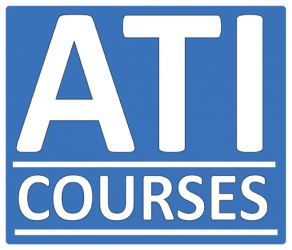Spacecraft Systems Integration and Test
Summary:
This four-day course is designed for engineers and managers interested in a systems engineering approach to space systems integration, test and launch site processing. It provides critical insight to the design drivers that inevitably arise from the need to verify and validate complex space systems. Each topic is covered in significant detail, including interactive team exercises, with an emphasis on a systems engineering approach to getting the job done. Actual test and processing facilities/capabilities at GSFC, VAFB, CCAFB and KSC are introduced, providing familiarity with these critical space industry resources.
What You Will Learn:
- How are systems engineering principals applied to system test?
- How can a comprehensive, realistic & achievable schedule be developed?
- What facilities are available and how is planning accomplished?
- What are the critical system level tests and how do their verification goals drive scheduling?
- What are the characteristics of a strong, competent I&T team/program?
- What are the viable trades and options when I&T doesn't go as planned?
This course provides the participant with knowledge and systems engineering perspective to plan and conduct successful space system I&T and launch campaigns. All engineers and managers will attain an understanding of the verification and validation factors critical to the design of hardware, software and test procedures.
Course Outline:
- System Level I&T Overview. Comparison of system, subsystem and component test. Introduction to the various stages of I&T and overview of the course subject matter.
- Main Technical Disciplines Influencing I&T. Mechanical, Electrical and Thermal systems. Optical, Magnetics, Robotics, Propulsion, Flight Software and others. Safety, EMC and Contamination Control. Resultant requirements pertaining to I&T and how to use them in planning an effective campaign.
- Lunar/Mars Initiative and Manned Space Flight. Safety first. Telerobotics, rendezvous & capture and control system testing (data latency, range sensors, object recognition, gravity compensation, etc.). Verification of multi-fault-tolerant systems. Testing ergonomic systems and support infrastructure. Future trends.
- Staffing the Job. Building a strong team and establishing leadership roles. Human factors in team building and scheduling of this critical resource.
- Test and Processing Facilities. Budgeting and scheduling tests. Ambient, environmental (T/V, Vibe, Shock, EMC/RF, etc.) and launch site (VAFB, CCAFB, KSC) test and processing facilities. Special considerations for hazardous processing facilities.
- Ground Support Systems. Electrical ground support equipment (GSE) including SAS, RF, Umbilical, Front End, etc. and Mechanical GSE, such as stands, fixtures and 1-G negation for deployments and robotics. I&T ground test systems and software. Ground Segment elements (MOCC, SOCC, SDPF, FDF, CTV, network & flight resources).
- Preparation and Planning for I&T. Planning tools. Effective use of block diagrams, exploded views, system schematics. Storyboard and schedule development. Configuration management of I&T, development of C&T database to leverage and empower ground software. Understanding verification and validation requirements.
- System Test Procedures. Engineering efficient, effective test procedures to meet your goals. Installation and integration procedures. Critical system tests; their roles and goals (Aliveness, Functional, Performance, Mission Simulations). Environmental and Launch Site test procedures, including hazardous and contingency operations.
- Data Products for Verification and Tracking. Criterion for data trending. Tracking operational constraints, limited life items, expendables, trouble free hours. Producing comprehensive, useful test reports.
- Tracking and Resolving Problems. Troubleshooting and recovery strategies. Methods for accurately documenting, categorizing and tracking problems and converging toward solutions. How to handle problems when you cannot reach closure.
- Milestone Progress Reviews. Preparing the I&T presentation for major program reviews (PDR, CDR, L-12, Pre-Environmental, Pre-ship, MRR).
- Subsystem and Instrument Level Testing. Distinctions from system test. Expectations and preparations prior to delivery to higher level of assembly.
- The Integration Phase. Integration strategies to get the core of the bus up and running. Standard Operating Procedures. Pitfalls, precautions and other considerations.
- The System Test Phase. Building a successful test program. Technical vs. schedule risk and risk management. Establishing baselines for performance, flight software, alignment and more. Environmental Testing, launch rehearsals, Mission Sims, Special tests.
- The Launch Campaign. Scheduling the Launch campaign. Transportation and setup. Test scenarios for arrival and check-out, hazardous processing, On-stand and Launch day. Contingency planning and scrub turn-arounds.
- Post Launch Support. Launch day, T+. L+30 day support. Staffing logistics.
- I&T Contingencies and Work-arounds. Using your schedule as a tool to ensure success. Contingency and recovery strategies. Trading off risks.
- Summary. Wrap up of ideas and concepts. Final Q & A session.
Speaker and Presenter Information
Robert K. Vernot has over twenty years of experience in the space industry, serving as I&T Manager, Systems and Electrical Systems engineer for a wide variety of space missions. These missions include the UARS, EOS Terra, EO-1, AIM (Earth atmospheric and land resource), GGS (Earth/Sun magnetics), DSCS (military communications), FUSE (space based UV telescope), MESSENGER (interplanetary probe).Relevant Government Agencies
Air Force, Army, Intelligence Agencies, DOD & Military, Dept of Energy, NASA, CIA, USAID
This event has no exhibitor/sponsor opportunities
When
Mon-Thu, Dec 5-8, 2011, 8:30am - 4:30pm
Cost
| Tuition: | $1890.00 |
Where
Doubletree Hotel Columbia
5485 Twin Knolls Road
Columbia, MD
Get directions
Website
Click here to visit event website
Organizer
ATI Courses





